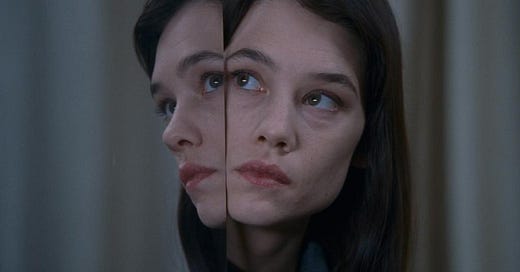L'Autre

The term "art film" is used in a lot of contexts, but what it means to your average moviegoer is "something froufrou I don't want to watch."
I like art films, along with virtually every other kind of film -- martial arts action flicks being the glaring exception -- but "L'Autre" ("The Other") is exactly the personification of the type of filmmaking many people are derisive of. It's tiresome, occasionally arresting, but mostly so very, very French.
Here's a good way to identify the bad sort of art film: ask someone who just watched it, "What's it about?" They'll have trouble saying.
As best as I can: "L'Autre" is a meditation on identity, grief, aging, love and especially boredom. The last one is not so much explicitly a theme of the movie as what people will experience watching it. I couldn't wait for it to be over.
Marie (Àstrid Bergès-Frisbey) is a young ballet dancer who has just lost her father (Jean-Louis Martinelli) in an accident. She is staying at his apartment, going through his things and reading his journal in which he, a poet, muses that "poetry is a trick." She gets a call from a photographer named Paul (James Thierrée). It seems that shortly before he died, her father arranged for a photography shoot of Marie for her birthday.
Paul tells her he understands if she doesn't want to come, but she does. (Why would anyone? Answer: because then there wouldn't be a movie.) What follows is an icky little dance in which Paul, much older and with the sort of hair that's never met a comb, looks at her very intently while offering her tea and conversation. Total creeper vibes from this guy, so we know what follows: they will fall in love.
It's the first film for writer/director Charlotte Dauphin, and it shows. Unable or unwilling to spin an interesting or cohesive story, she falls back on the old saw of substituting moody imagery and pregnant pauses for narrative and character-building. I'm reminded of the old "Family Guy" joke: "A good-looking depressed guy smoking a cigarette is not a movie."
There are a lot of good-looking depressed people smoking in "L'Autre."
The story goes sideways from there. Marie meets with an older woman (Anouk Grinberg) we take to be her mother, seeing as how she's always offering unsolicited advice. But didn't somebody say something about her mother having died years earlier? And why is Marie constantly following visions of her father walking around, going somewhere but never saying anything? And seeing visions of herself years ago as a child walking with her mom, who looks nothing like the woman we just met?
Oh yes, that's because this also is Marie, years later, grown even sadder and more lonely. She's been gradually pushing Paul away but there's no guilt because failed romances are nobody's fault, which is a very French thing to say. Meanwhile, Paul's tousled salt-and-pepper 'do grows a little more salt.
Don't get me wrong, I'm down with non-linear storytelling and dreamlike stories. Love Luis Buñuel. Was riveted by "A Ghost Story," in which Rooney Mara does nothing but eat a pie for nine minutes. But there's got to a through-line of storytelling somewhere in there. Otherwise it's just images and mood. Those are feelings, not film.
[embed]https://www.youtube.com/watch?v=JLDG4vDN23A[/embed]



